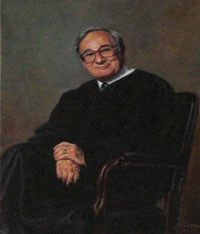Date of Birth: February 6, 1923
Zodiac Sign: Aquarius
Date of Death: January 29, 2000
Biography
Harold H. Greene was a distinguished American judge best known for his pivotal role in the landmark antitrust case that led to the breakup of the AT&T monopoly in 1982. Born in Frankfurt, Germany, Greene emigrated to the United States in 1943 to escape the Nazi regime. He earned his law degree from George Washington University Law School in 1952 and initially worked at the Department of Justice, where he contributed to the drafting of the Civil Rights Act of 1964 and the Voting Rights Act of 1965. In 1978, President Jimmy Carter appointed Greene to the United States District Court for the District of Columbia. His most notable case was United States v. AT&T, where he presided over the antitrust lawsuit that resulted in the divestiture of AT&T into seven regional Bell companies. This case significantly altered the telecommunications landscape in the United States. Greene continued to serve on the bench until his retirement in 1995. He passed away on January 29, 2000, leaving behind a legacy of judicial independence and commitment to fair competition and civil rights.
5 Interesting Facts about Harold H. Greene
1. Harold H. Greene was originally named Heinz Grünhaus before he anglicized his name upon emigrating to the United States.
2. He played a crucial role in drafting key pieces of civil rights legislation during the 1960s.
3. Greene’s decision in the AT&T case is often cited as one of the most influential antitrust rulings in U.S. history.
4. He served in the U.S. Army during World War II and participated in the Normandy invasion.
5. Greene was known for his meticulous attention to detail and his unwavering commitment to judicial independence.
5 Most Interesting Quotes from Harold H. Greene
1. “The law must be stable, but it must not stand still.”
2. “Judicial independence is the cornerstone of a fair and impartial judiciary.”
3. “Antitrust laws are the Magna Carta of free enterprise.”
4. “Civil rights are not just a set of legal protections but the foundation of a just society.”
5. “The role of the judiciary is to interpret the law, not to make it.”
Highest Net Worth Achieved
Harold H. Greene’s net worth is not publicly documented, as public servants like judges typically do not amass significant wealth through their judicial roles.
Children
Harold H. Greene had one daughter, Deborah Greene, who followed in her father’s footsteps in pursuing a legal career.
Relevant Links
1. [Harold H. Greene – Wikipedia](https://en.wikipedia.org/wiki/Harold_H._Greene
2. [Biography on Federal Judicial Center](https://www.fjc.gov/history/judges/greene-harold-h
5. [Harold H. Greene Papers – Library of Congress](https://www.loc.gov/item/mm96083971/

